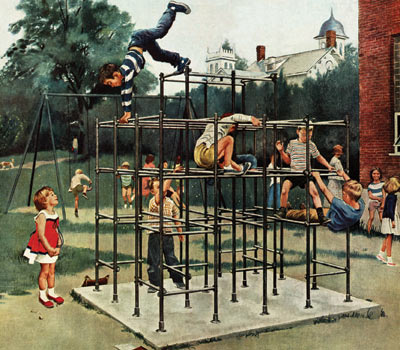Class Inaction
SLUG: Lighter Side

My younger son recently graduated from high school and has expressed an interest in becoming a teacher. My mother was a teacher and enjoyed it, but that was before politicians took over a perfectly fine system of public education and ruined it. Today’s teachers spend most of their time teaching children how to take tests most of the politicians looking over their shoulders couldn’t pass.
When I was a kid, politicians kept their noses out of education. This was a fine arrangement, and worked well for all concerned, especially the children, who, like all living things, grow best in the loosened soil of relaxed oversight. With the government came experts on children, and with them came the smothering compaction that turned learning from a natural joy to the forced and anxious march it is today.
Nowhere is the difference between yesterday and today drawn so sharply as in my memory of fourth grade when, during recess, I was pushed to the ground by Ricky Smith. Ricky wasn’t a bully. I had pushed him down the day before, so this was a matter of simple justice. I landed on my chin and suffered a deep cut. Mrs. Conley took me to the school nurse, Mrs. Widener, who handed me a towel so I wouldn’t drip blood on the floor. This pre-dated the current era of child worship, and her chief concern was for the janitor, a priority I accepted without question.
“Let’s go see Doc Kirtley,” she said, taking me by the hand and walking me the four blocks to his office. We sat in the waiting room, Mrs. Widener skimming The Saturday Evening Post and I, the Highlights magazine, while leaking blood. After a time, Dr. Kirtley called us back to the examination room, studied my chin, threaded a needle, and closed my wound with six snug stitches. He topped it off with a Curad bandage, let me pick out a toy from the top drawer of his desk, and sent us on our way. No forms were filled out, no money exchanged, no report filed.
On the way back to school, it being lunchtime, Mrs. Widener and I stopped at the Coffee Cup restaurant on the south side of the town square, and had hamburgers, French fries, and a Coke. I thought of my classmates back at school eating spinach and lima beans and made a mental note to thank Ricky Smith, whose passion for righteousness had made this blessing possible. I returned to Mrs. Conley’s room a conquering hero, a wounded veteran back from the trenches. That evening my mother noticed the bandage on my chin and asked what had happened.
I had not yet learned to stretch out a good story, so my report was succinct. “Ricky Smith pushed me and I cut my chin, so Mrs. Widener took me to the doctor’s and I got six stitches.”
“You and Ricky be more careful,” she advised, and the matter was closed. No call was made to the principal. No lawyer was consulted. No threats to sue issued. My injury was accepted for what it was–the natural consequence of youthful exuberance. We knew no better then. I recall this event not because of the stitches. I suffered many accidents as a child and was often sewn back together. No, I remember it for the unhurried stroll to the doctor’s office, the hamburger at the Coffee Cup, and the casual manner with which my injury was tended. I have stayed in close contact with education–my wife is a school librarian–and know the tumult that would result were such a thing to happen today. Parents would be phoned, an officer and ambulance summoned, depositions demanded, and fault assigned. Ricky Smith would be suspended from school and made to undergo counseling. I would become a poster child for dangerous schools, one more example to tug the heartstrings and purse strings of an anxious public.
“Now go back to class and try to learn something,” Mrs. Widener told me, after snipping free the stitches. I think of her still, that bewildered, backward woman, failing to grasp the complexities of modern life.